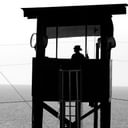By WILLIAM SAFIRE
The New York Times, A19
November 26, 2001
WASHINGTON — As soon as German U‑boats put eight saboteurs on U.S. shores during World War II, one of the eight called the F.B.I. to betray the mission but was brushed off as a crackpot. Days later, he called again and managed to persuade the F.B.I. he was an authentic saboteur. Partly to keep this embarrassment of bungled enforcement from becoming known, the eight were secretly tried by a military court inside the F.B.I. headquarters.
Unexpectedly, a U.S. Army lawyer assigned to the Germans mounted a spirited defense. Col. Kenneth Royall, citing the landmark 1866 Supreme Court decision of Ex Parte Milligan — holding that martial law could not be applied where federal civil courts were in business — challenged the secret tribunal’s legality.
F.D.R. told his attorney general, according to Francis Biddle’s memoirs, that he would resist any Supreme Court decision to give the accused saboteurs a regular court trial: “I won’t hand them over to any United States marshal armed with a writ of habeas corpus.” Confrontation was averted when a cowed Supreme Court unanimously acknowledged the extra- judicial power of a president armed with a Congressional declaration of war. Six of the eight captives went to the electric chair; J. Edgar Hoover was awarded a medal of honor.
Now President Bush, with no such Congressional declaration, is using that Roosevelt mistake as precedent for his own dismaying departure from due process. Bush’s latest self-justification is his claim to be protecting jurors (by doing away with juries). Worse, his gung-ho advisers have convinced him — as well as some gullible commentators — that the Star Chamber tribunals he has ordered are “implementations” of the lawful Uniform Code of Military Justice.
Military attorneys are silently seething because they know that to be untrue. The U.C.M.J. demands a public trial, proof beyond reasonable doubt, an accused’s voice in the selection of juries and right to choose counsel, unanimity in death sentencing and above all appellate review by civilians confirmed by the Senate. Not one of those fundamental rights can be found in Bush’s military order setting up kangaroo courts for people he designates before “trial” to be terrorists. Bush’s fiat turns back the clock on all advances in military justice, through three wars, in the past half-century.
His advisers assured him that a fearful majority would cheer his assumption of dictatorial power to ignore our courts. They failed to warn him, however, that his denial of traditional American human rights to non- citizens would backfire and in practice actually weaken the war on terror.
Spain, which caught and charged eight men for complicity in the Sept. 11 attacks, last week balked at turning over the suspects to a U.S. tribunal ordered to ignore rights normally accorded alien defendants. Other members of the European Union holding suspects that might help us break Al Qaeda may also refuse extradition. Presumably Secretary of State Colin Powell was left out of the Ashcroft try- ‘em-and-fry-‘em loop.
Thus has coalition-minded Bush undermined the antiterrorist coalition, ceding to nations overseas the high moral and legal ground long held by U.S. justice. And on what leg does the U.S now stand when China sentences an American to death after a military trial devoid of counsel chosen by the defendant?
We in the tiny minority of editorialists on left and right who dare to point out such constitutional, moral and practical antiterrorist considerations are derided as “professional hysterics” akin to “antebellum Southern belles suffering the vapors.” Buncha weepy sissies, we are. (Frankly, Scarlett, I don’t give a damn — I’ve always been pro-bellum.)
The possibility of being accused, however, of showing insufficient outrage at those suspected of a connection to terrorists shuts up most politicians. And a need to display patriotic fervor turns Bush’s liberal critics into exemplars of evenhandedism. Careers can be wrecked by taking an unpopular stand.
But not always. Forty years ago, my political mentor introduced me to his senior partner, Ken Royall, who after World War II had been appointed by President Truman to be the last secretary of war. Royall, then head of a great New York law firm, considered the high point of his career his losing fight to get a group of reviled Nazi terrorists a fair American trial.



